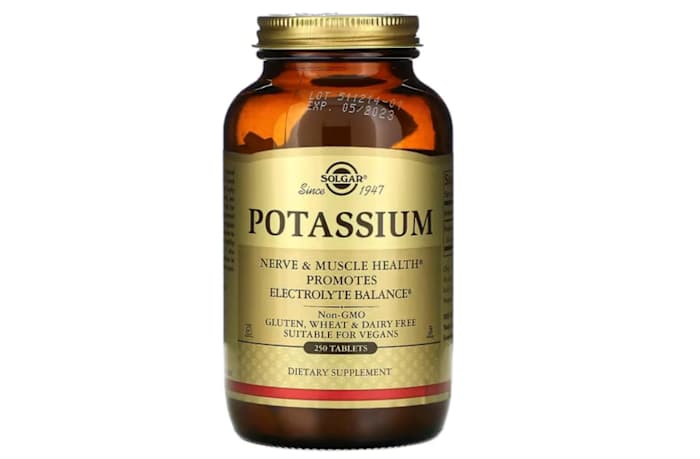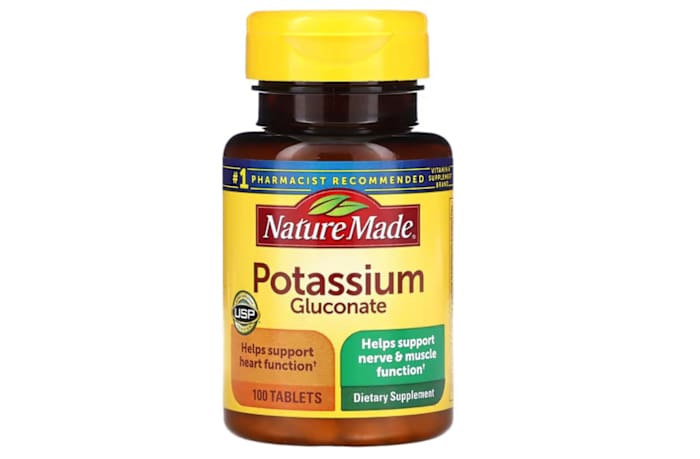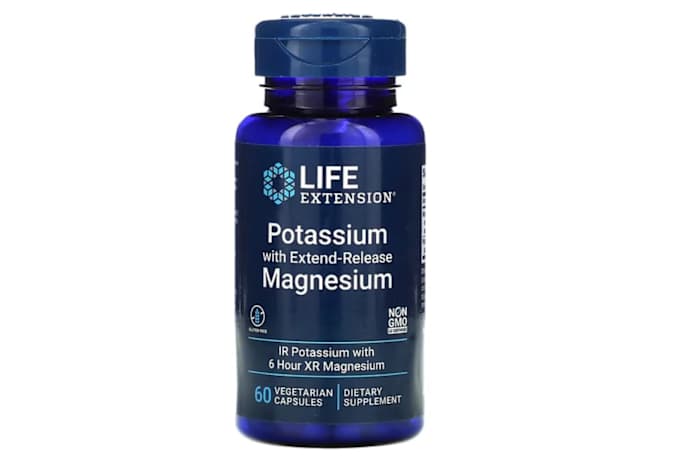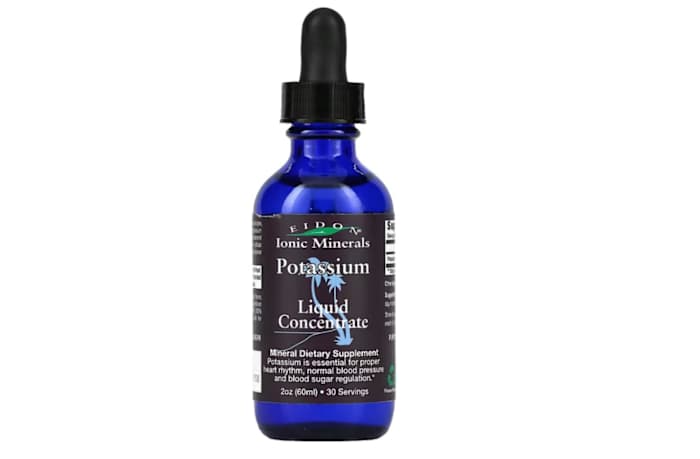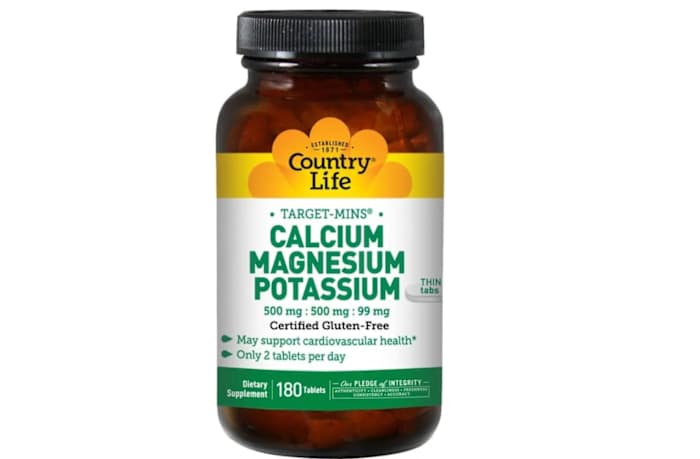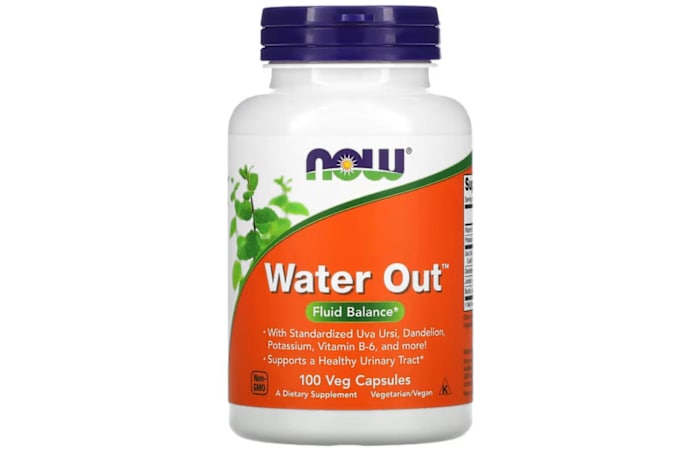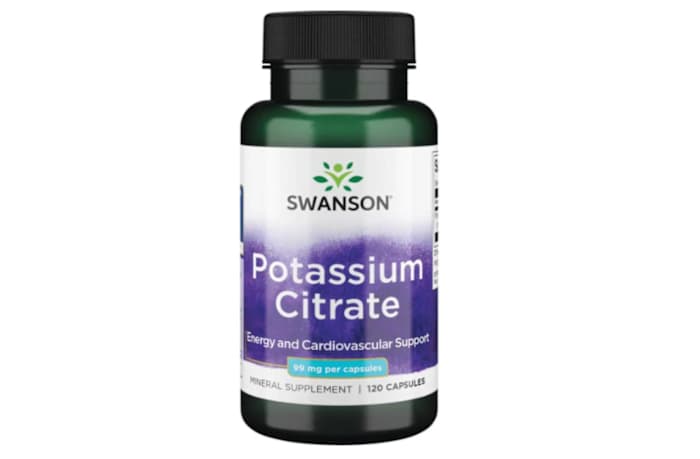The products featured in this article have been independently reviewed. When you buy something through the retail links on this page, we may earn commission at no cost to you, the reader. Sports Illustrated editorial staff are not involved in the creation of this content. Learn more here.
Potassium is a mineral and electrolyte that many of us may be deficient in, as it can be difficult to obtain from diet alone. In fact, the go-to potassium option, a banana, only contains about 422 milligrams per piece of fruit. That’s significantly less than the current FDA recommended daily value of 4,700 milligrams of potassium for adults. In this comprehensive guide, we provide an overview of potassium, its function in the body and the different forms of the mineral that we can add to our diet. We’ve compiled our best picks for potassium supplements for various goals, including reducing leg cramps, aiding in athletic recovery, decreasing blood pressure and losing weight. We also dive into the effects of potassium so you can determine which is the best supplement for you in 2024.
Our Picks for the Best Potassium Supplement of 2024:
- Best Potassium Supplement for Leg Cramps: Solgar Potassium
- Best Potassium Supplement for High Blood Pressure: Nature Made Potassium Gluconate
- Best Potassium Supplement with Magnesium: Life Extension Potassium with Magnesium
- Best Liquid Potassium Supplement: Eidon Potassium Liquid Concentrate
- Best Potassium Supplement for Athletes: Country Life Calcium Magnesium Potassium
- Best Potassium Supplement for Water Retention: NOW Foods Water Out
- Best Potassium Supplement for Improving Metabolism: Swanson Ulta Potassium Citrate
Best Potassium Supplement for Leg Cramps: Solgar Potassium
Key features:
- Contains 99 milligrams of potassium gluconate per one tablet
- Provides 250 servings per container
- Presented as potassium gluconate
- Gluten, wheat and dairy free
- Certified Kosher
- Vegan
- Free of sugar, salt, artificial flavors, artificial sweeteners, artificial preservatives, artificial colors
For more than 75 years, Solgar has created supplements balanced by nature and science, with many products free of fillers or artificial ingredients and certified Kosher.
Solgar Potassium comes in a recyclable, amber glass bottle that guards against heat, light and moisture to protect the supplements from damage. Solgar Potassium supplements are certified Kosher and are free of harmful additives like preservatives, flavors and sweeteners. It is also a cost friendly option at only $0.06 per tablet.
We recommend Solgar Potassium as the best potassium supplement for leg cramps because it uses potassium gluconate. This form of potassium has a high absorption rate of approximately 94 percent. Pair this supplement alongside massage gun therapy or a personal foot massager to ease your cramping muscles.
Pros
- Cost effective at $0.06/tablet
- Bioavailable form of potassium for easy absorption
Cons
- Provides only two to three percent of required daily potassium intake
- Not third party tested
Best Potassium Supplement for High Blood Pressure: Nature Made Potassium Gluconate
Key features:
- Provides 90 milligrams total from one tablet
- One tablet per serving; 100 servings per container
- No color added, no artificial flavors
- Gluten free
- USP tested and verified ingredients
Nature Made is a household name that has provided dietary supplements since 1971. All Nature Made’s products are USP verified when possible. While providing quality ingredients, Nature Made also keeps price in mind, offering this supplement at only $0.05 per serving.
Studies show increasing your daily intake of potassium can reduce the risk of cardiovascular diseases such as high blood pressure, heart disease and reduce the risk of stroke.
Nature Made Potassium Gluconate is our top pick for the best potassium supplement for high blood pressure because this form of potassium mitigates effects of sodium which can directly impact heart health.
Pros:
- Cost effective at $0.05 per serving
- USP tested and verified ingredients to ensure safety
Cons:
- Only 100 servings per container
- No extra certifications like Kosher certified
Best Potassium Supplement with Magnesium: Life Extension Potassium with Magnesium
Key features:
- 99 milligrams of potassium chloride and 250 milligrams magnesium per vegetarian capsule
- One capsule per serving, providing 60 capsules per container
- Extended release magnesium
- Gluten free
- Non-GMO
- Vegetarian
Life Extension provides a 100 percent satisfaction guarantee as it believes this supplement is the best for providing potassium alongside magnesium in an extended release format.
Potassium is useful for cardiovascular health, nerve and muscle function. Magnesium is another mineral important for blood pressure, heart health and even bone strength. While magnesium supplements alone are worthwhile, together, this combination can enhance your health and provide dual benefits in a small, but mighty package.
Life Extension Potassium with Magnesium is our pick for best potassium supplement with magnesium because it is useful for nearly everyone, especially those looking for dual blood pressure support. However, magnesium may provide a laxative effect, so it may not be a great fit for people suffering with bowel movement irregularities or chronic diarrhea.
Pros:
- Combined with extended release magnesium to provide extra cardiovascular benefits
- Includes a trademarked form of magnesium meant to provide immediate and extended support
Cons:
- Magnesium portion may serve as a laxative in some individuals
- More expensive at $0.19 per serving
- Only provides 60 capsules per container
Best Liquid Potassium Supplement: Eidon Potassium Liquid Concentrate
Key features:
- 99 milligrams of potassium chloride per serving
- Serving size of 30 drops (two milliliters), providing 30 servings per bottle
- Accessible for people who cannot swallow pills, capsules or tablets
- Vegan; has never been tested on animals
- Gluten free
- Made in the USA
Our pick for best liquid potassium supplement is Eidon Potassium Liquid Concentrate. This option is excellent for people who struggle to swallow pills, tablets or capsules. Eidon Potassium Liquid Concentrate can be combined with water, making it easy for anyone to consume. This product is also a great choice for anyone needing a liquid supplement on the go because it doesn’t need to be refrigerated.
Eidon manufactures all supplements in San Diego, California. The company prides itself on passion for mineral balance and mineral supplementation. It creates gluten free and vegan supplements that have never been tested on animals which makes this an excellent choice if you’re looking for cruelty-free products.
Pros:
- Only other listed ingredient is deionized water
- Can be taken with water, making it accessible and easy to consume
Cons:
- No third party certifications for ingredient quality
- More expensive at approximately $0.70 per serving
- Droppers can be unreliable for actual serving sizes and vary depending on user
Best Potassium Supplement for Athletes: Country Life Calcium Magnesium Potassium
Key features:
- Provides 99 milligrams potassium, 500 milligrams magnesium, 250 milligrams phosphorus and 500 milligrams calcium per serving
- Two tables per serving, with 90 servings per container
- Provides a calcium:phosphorus ratio of two to one to support calcium utilization
- Multitude of certifications such as USDA organic certified, non-GMO Project Verified, certified Kosher, certified vegetarian, certified Halal and more
Athletes, like runners, are often no strangers to taking supplements to ensure proper nutrition and stay healthy. Country Life Calcium Magnesium Potassium is a multipurpose supplement that is an excellent choice for athletes. It contains multiple micronutrients including potassium, magnesium, phosphorus and calcium. All of these micronutrients are beneficial for athletes, particularly to support muscle contraction and recovery, bone health, blood sugar levels and even heart health. Athletes can pair these micronutrients with stretching and foam rolling, to ease their recovery.
It is important to note that potassium citrate, the main form of potassium in this supplement, serves as a diuretic which can impact athletic performance in some people. However, the combination of micronutrients make this our choice for best potassium supplement for athletes, especially at an incredible price point.
Pros:
- Economical option at $0.19 per serving for four micronutrients
- Provides multiple micronutrients in just two capsules
- Utilizes three forms of potassium including potassium citrate, aspartate and alpha-ketoglutarate
Cons:
- Magnesium may act as a laxative in some individuals
- May provide excess micronutrients not required for some people
Best Potassium Supplement for Water Retention: NOW Foods Water Out
Key features:
- Provides 99 milligrams potassium per serving alongside other herbs and micronutrients
- $0.11 per serving and each container provides 50 servings
- One of the first companies to be CGMP certified by a third party
- Vegan and vegetarian
Our choice for the best potassium supplement for water retention is this unique blend from NOW Foods. NOW Foods Water Out not only utilizes potassium for its diuretic properties, but incorporates Uva Ursi extract, dandelion leaf and juniper berries to support a healthy urinary tract.
Research indicates that both dandelion and juniper also function as diuretics, making this combination a potent solution for water retention. When turning to potassium supplements for water retention alongside blood pressure regulation, blood sugar balance and more, NOW Foods Water Out is an excellent choice.
Pros:
- Provides additional herbs and micronutrients to support healthy water retention
- Made and quality tested in the USA
- Not manufactured with wheat, gluten, soy, milk, egg, fish, shellfish or nut ingredients
Cons:
- One serving size is two capsules, unlike some other potassium supplements
- May provide strong diuretic effects which can be harmful
Best Potassium Supplement for Improving Metabolism: Swanson Ultra Potassium Citrate
Key features:
- Provides 99 milligrams potassium per capsule
- One capsule per serving size with 120 servings per container
- Includes pure, optimum-potency 99 milligrams potassium citrate
Our pick for the best potassium supplement for improving metabolism is Swanson Ultra Potassium Citrate. New research shows promising results for weight loss and increasing metabolism through the use of healthy habits alongside potassium supplementation.
Additionally, this supplement does not contain excess or artificial ingredients or fillers. With only four ingredients in total, it is a simple blend that can be taken to meet metabolic goals.
Pros:
- Incredible price value at about $0.03 per serving
- Registered GMP Facility by NSF International
- 100 percent satisfaction money-back guarantee
Cons:
- No extra certifications like certified non-GMO, gluten-free
- Commonly used to treat kidney stones and/or gout and may (or may not) be appropriate for people with history of either condition
What Is Dietary Potassium?
Potassium is a mineral needed by all of the organs and functions in our body. However, its primary function is to control fluid levels inside of our cells. Combined with sodium, potassium is necessary for the balance of fluids that can influence blood pressure, kidney function and overall heart health.
Potassium is found in a wide variety of foods including lentils, beans, potatoes, apricots and other fresh fruits and vegetables. A popular source of potassium is the banana, offering approximately 422 milligrams per fruit. However, it can be difficult for some people to meet their body’s potassium needs from food alone.
Why Buy a Potassium Supplement?
Potassium supplements can be beneficial for a wide variety of health conditions and functions.
Potassium supplements offer a host of benefits include increased blood pressure control or management, improve kidney function and help prevent strokes.
Potassium can also help athletes. Athletes require support for their heart, smooth and skeletal muscles and the need to replenish glycogen (energy) stores. Potassium supplements may be able to help athletes achieve their goals and minimize exhaustion.
With any kind of supplements, side effects must be considered. Hyperkalemia, a condition where you have high potassium levels in your blood, can cause symptoms such as muscle weakness or numbness, nausea or simply just feeling “off.” It can be serious, so it is best to consult your healthcare provider before purchasing a potassium supplement.
Who Should Take Potassium Supplements?
Many people can benefit from potassium supplements, especially those who aren’t consuming enough nutrient-rich foods in their diet. Anyone who is not consuming fresh fruits, vegetables, beans or legumes may benefit from potassium supplements.
In particular, the following groups of people may benefit from potassium supplementation because it can be more difficult for their bodies to absorb and utilize potassium:
- Those with inflammatory bowel diseases like Crohn’s disease or ulcerative colitis
- People with pica, a condition in which you eat non-food items
- People on certain medications including diuretics or laxatives
Athletes, those trying to lose weight, people suffering from leg cramps and more could benefit from potassium supplements. Ultimately, potassium can be a great addition to an already healthy diet and lifestyle.
How Much Potassium Do You Need?
The National Academies of Sciences, Engineering and Medicine (NASEM) provides Daily Reference Intakes (RDI’s) based on the latest scientific findings for each micronutrient.
While there is no current Recommended Daily Allowance (RDA) for potassium, the group has determined Adequate Intake (AI) for dietary potassium. The AI is the amount needed to ensure nutritional sufficiency. This is because research does not currently understand the upper limit of potassium intake, but researchers do know the minimum amount of potassium needed for our health.
The AI for men ages 19 and older is 3,400 milligrams per day. Females ages 19 and older require 2,600 milligrams per day. However, females who are pregnant or nursing require between 2,500 milligrams and 2,900 milligrams of potassium each day depending on age and other factors.
The FDA offers its own recommendations; that adults should get 4,700 milligrams of potassium per day. That daily value is based on the nutrients in foods and dietary supplements within the context of a total diet
Potassium deficiency can occur if the Adequate Intake of potassium is not met from food sources alone. Hypokalemia, or potassium deficiency, causes symptoms like constipation, fatigue, tingling and numbness and more. Hypokalemia can also develop from conditions like chronic kidney disease, low magnesium, alcohol abuse and disordered eating among other causes.
On the other end of the spectrum, it is possible, yet rare, to consume too much potassium through food or supplements. Hyperkalemia is a condition that occurs when the body has too much potassium and it can cause heart palpitations, nausea, vomiting or shortness of breath.
Forms of Potassium
There are many available forms of potassium, each with various pros and cons. Common forms of potassium used in supplements include: potassium citrate, potassium phosphate, potassium aspirate, potassium bicarbonate, potassium gluconate and potassium chloride.
Potassium chloride
This is one of the most popular forms of potassium and is commonly found in prescription supplements. Potassium chloride can be expensive since it is not typically found over-the-counter. It can rapidly raise potassium levels, which can be dangerous for some people.
Potassium gluconate
Another form of potassium, potassium gluconate, is commonly found in over-the-counter supplements. Potassium gluconate has a high bioavailability—the proportion of the supplement that enters circulation in our body—of about 94 percent, similar to the bioavailability of potatoes.
Potassium citrate
Interestingly, potassium citrate acts as a diuretic, which means this form can affect how often you need to urinate. This may make it a less favorable form of potassium for the average person to use. It also is typically used more as a food additive and less in supplementation.
While there are a multitude of forms of potassium, each one has advantages and disadvantages that can be tailored to someone’s needs and goals.
Best Potassium Supplement FAQs
What happens if you take potassium every day?
Before taking potassium supplements daily, it is best to consult a healthcare professional. This is because hyperkalemia, or increased potassium, is a rare but serious condition. Your medical provider will guide you in determining if daily intake of potassium supplements are the right decision for you.
Which is better: potassium chloride or potassium gluconate?
Both potassium chloride and potassium gluconate can be useful for certain health conditions or health goals. Potassium gluconate has a high absorption rate of approximately 94 percent, making it useful for “quick” needs like leg cramps or blood pressure management. Potassium chloride is commonly prescribed by a doctor for hypokalemia, or low potassium levels. This medication must be more regularly monitored as side effects from dosage concerns are more serious.
Does vitamin D affect potassium levels?
Currently, research does not indicate a strong relationship between vitamin D and potassium. However, both potassium and adequate vitamin D levels are important for maintaining a healthy lifestyle.
Should I take potassium at night or in the morning?
Potassium supplements can be taken at any time of day, although it is always best to consume potassium alongside a glass of water and/or a meal.
What blocks absorption of potassium?
Potassium plays an important role in balancing against sodium, another blood electrolyte. Therefore excess sodium in your diet may block absorption or reduce the bioavailability of potassium. Some research indicates that both caffeine and tobacco may reduce the absorption of potassium.
How can I test my potassium levels at home?
Currently, it is difficult, if not impossible, to test your potassium levels at home. This is because potassium testing is often part of a basic metabolic panel, which is a common blood test that only your doctor or healthcare provider can order. However, some new technologies may make it accessible in the future to test potassium and other electrolyte markers right from the convenience of your own home.
Final Thoughts
Although there are many sources of potassium, like cantaloupe and bananas, it can be difficult to consume enough of the mineral from food alone. The FDA recommends adults get 4,700 milligrams of potassium per day. This important electrolyte is needed to maintain a multitude of functions in the body related to blood pressure, heart health, blood sugar balance and much more. This makes supplementation a common and convenient choice.
With so many dietary supplements out there, it can be difficult to choose the best one for you. It is important to consider all aspects of supplementation from cost to effectiveness and health benefits. Potassium deficiency is common and potassium supplements may be able to help reduce symptoms like leg cramps, blood pressure imbalances, improve kidney function and more. As always, consult with your healthcare provider to determine if potassium supplements are the right choice for you.
Prices are accurate and items in stock as of publish time.

